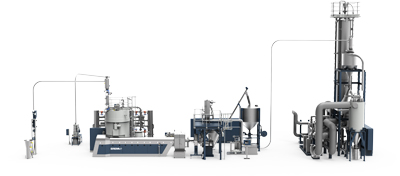
| Plastics News |
Erema presents new bottle-to-bottle process for food-contact-grade rPET
New bottle-to-bottle process for food-contact-grade rPET pellets stands out through efficient decontamination, compact design and low energy consumption, Erema claims. November, 26, 2018 – The Austrian producer of plastics recycling machines brings together its Vacurema® bottle-to-bottle process with newly patented, vacuum-supported solid state polycondensation (SSP) from Polymetrix in this innovation. All thermal process steps take place in nitrogen atmosphere. The result is rPET pellets which are unique in quality and far exceed all food-contact requirements, Erema guarantees. With Vacunite, Erema expands its portfolio for PET recycling solutions. The company says that this technology is the answer to the challenges which PET recycling will have to face in the future. Christoph Wöss, Erema Business Development Manager for the bottle sector, sums up these challenges as follows: "The growing commitment in society to handling plastics in a responsible way means that both political requirements and voluntary pledges of major beverage brands call for a significant increase in the amount of recyclate in end products. To fulfil these requirements, even more material in general and with varying quality due to different collection systems has to be recycled while, at the same time, the big brands are becoming even stricter with their requirements regarding the recyclates produced". The best technologies in one plant The focus of the next development of the PET recycling technology was on improving quality even further. "Our new development brings together the best of what is technically possible," says a convinced Wöss. The process is based on the combination of Vacurema® technology, which has been enhanced for this application, and the newly patented, vacuum-supported nitrogen SSP from Polymetrix. All thermal process stages take place in nitrogen atmosphere, largely eliminating flake and pellet discoloration and reliably removing additives which could lead to undesired reactions in the melt, Erema says. The company also says that another benefit of Vacunite is: The vacuum support cleans the nitrogen which means it can be returned to the previous processing stage and nitrogen consumption is reduced as a result. Any remaining dust particles are removed from the pellets before filling to avoid preform contamination. "Using vacuum support and nitrogen atmosphere creates rPET recyclates which far exceed all existing food contact requirements, even those of the major beverage brands," emphasises Wöss. The recycling technology also stands out through its comparatively compact build, low energy consumption and, compared to vacuum SSP systems, considerably lower maintenance, Erema claims. Depending on machine type, 50 to 60 square metres of floor space is sufficient for the SSP part. The height and substructure also have less impact on the dimensions of the plant building compared to other SSPs. The Austrian manufacturer says that the energy consumption of Vacunite for the entire production process from the flake to the final pellets amounts to a mere 0.35 kWh per kg. "With Vacunite we offer our bottle-to-bottle customers a new technology in addition to the existing portfolio which sets new standards at all levels from technical performance to rPET quality," says Manfred Hackl, CEO Erema Group with conviction and he adds: "There is a great amount of interest. A first customer in Europe has already decided to invest in a Vacunite recycling plant prior to the official product launch". Source: Erema
|

